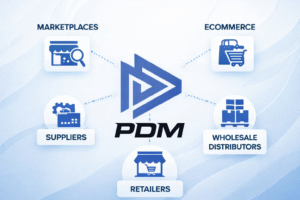According to SEMA, about 60 million people, or ⅓ of owners, will modify their vehicles in some way.
Clark Gable and his customized 1935 Duesenberg Model JN, chassis #2585
Since the inception of the automobile industry, drivers have been customizing their vehicles to match their unique personality and style.
From iconic stars like Clark Gable during the Golden Age of Hollywood to modern social media influencers flooding our feeds with supercars designed to push the limits of engineering, custom cars have always captivated the American spirit. Thousands of aftermarket brands and online retailers drive this culture, allowing enthusiasts and lifestyle shoppers to customize their rides in unique and exciting ways. From track days to heading out into the backcountry on an overlanding trip, people want to do more with their vehicles than ever.
Tapping into the culture of customization and personalization requires brands to fully understand their customer’s desires and prioritize an effective product information management (PIM) strategy that connects people with the products they love.
Challenges in delivering personalized experiences
Creating personalized experiences that resonate with individual needs and preferences becomes more difficult without a comprehensive view of customer insights and data.
Data collected from sales, customer service, and marketing departments are often stored separately and not integrated. This disjointed data landscape hampers the flow of information and restricts the depth of customer insights.
In the aftermarket sector, where purchases can be infrequent and driven by desire, gathering rich, actionable data about customers’ buying behaviors, preferences, and future needs is particularly challenging. This limitation makes it difficult for brands to anticipate customer needs or tailor their offerings effectively.
So, what can aftermarket companies do to overcome these challenges? Read on to learn more.
Actionable insights and predictive analysis
Gathering and analyzing customer data allows businesses to identify trends, preferences, and pain points that can effectively guide their decision-making.
This level of insight is essential for making informed decisions that enhance customer satisfaction and loyalty. Companies can build a comprehensive profile of their customer base by collecting data from various touchpoints, such as purchase history, customer feedback, and online interactions.
This data provides both actionable insights and predictive analysis.
Actionable insights use data analytics that can guide product development, marketing strategies, and customer service improvements.
Predictive analysis employs predictive analytics to anticipate customer needs before they arise, ensuring readiness to meet demands.
Techniques for Effective Customer Segmentation
Segmentation allows businesses to tailor their marketing and service efforts to match the specific needs of different groups, enhancing the efficiency of these initiatives:
Demographic Segmentation: Classify customers based on age, income, occupation, etc., to tailor products that suit their socio-economic conditions.
Behavioral Segmentation: Focus on purchasing behaviors and usage rates to offer more personalized product upgrades or maintenance services.
Geographic Segmentation: Adapt offerings based on the geographic location of customers, which can influence the type of aftermarket parts and services needed due to factors like climate and road conditions.
Putting targeted data to work
Companies looking to take advantage of the customization culture must effectively blend customer insights with customer segmentation to build a winning strategy.
Tailored Product Offerings
Fully understanding your customer base and buying habits positions your aftermarket brand to offer specific products that resonate with your customer base and the shifting needs of the marketplace.
For example, a Jeep suspension manufacturer may have started off by producing equipment designed specifically for rock crawling or dune running, but over time, they realized a growing interest in overlanding amongst their customer base by analyzing purchase histories and customer feedback. Thanks to this customer data, the manufacturer could justify investment and direct resources to R&D to develop a suspension lineup tailored to the unique needs of the overlanding enthusiast.
This level of insight was possible thanks to actionable insights gleaned from customer data.
Customizing Communication Strategies
Personalized communication plays a pivotal role in connecting with customers more meaningfully.
Companies can deliver messages that resonate personally with each recipient by utilizing channels such as email, SMS, and social media. Best practices include integrating automated systems that can deliver personalized messaging based on customer behavior and preferences, ensuring that each interaction feels both personal and relevant.
Email Campaigns: Craft emails that address customer interests based on their previous interactions and purchases.
SMS Updates: Send timely notifications about new products and services tailored to customer preferences.
Social Media Engagement: Use customer data to create content that speaks directly to different segments on platforms they frequent.
Personalized Marketing and Promotions
When it comes to marketing and promotions, using targeted campaigns that utilize deep customer insights can lead to more effective promotions tailored to specific demographics, increasing relevance and response rates.
AI-Powered Recommendations: Deploy AI tools to analyze customer data and predict future purchases, facilitating proactive product development and marketing strategies.
Targeted Promotions: Design promotions that appeal to specific segments, increasing the likelihood of conversion by appealing directly to their preferences and needs.
Success Case Studies: Reference industry examples where personalized approaches have increased market share and customer retention.
Executing a winning product strategy
Data builds the strategy, while a PIM system helps execute the strategy.
Now that you’ve got the right products, a solid communication plan, and effective marketing strategies, it’s time to combine these tactics together to connect with buyers across multiple channels.
This strategy requires a quality PIM system, like PDM Automotive, to fully realize its benefits.
Here’s how PDM Automotive’s PIM system aids brands in making vehicle customization user-friendly and efficient:
Centralized Product Data: PDM Automotive’s PIM system provides a single source of truth for all product information, including detailed specifications, compatibility information, installation instructions, and high-quality images or videos. This central repository ensures that all data related to customization options is up-to-date and easily accessible. This means customers can find comprehensive and accurate information about aftermarket parts and accessories that fit their specific vehicle model, making informed decisions about customizations easier.
Enhanced Product Discovery: The PIM system improves the search and navigation capabilities on a brand’s website or other sales channel. Customers can filter and search for products based on specific criteria such as vehicle model, year, part type, or performance needs. This tailored search process simplifies the journey of finding the right components for vehicle customization, enhancing the user experience.
Accurate Compatibility Information: One of the biggest challenges in vehicle customization is ensuring part compatibility. PDM’s PIM system helps brands provide precise compatibility data, which reduces the risk of customers purchasing incorrect or incompatible parts. This accuracy is crucial for building customer trust and satisfaction, as they can confidently customize their vehicles, knowing that the parts will fit and function as expected.
Support for Cross-Selling and Upselling: By utilizing a PIM system, brands can effectively showcase related products and accessories that complement a customer’s current selection. For example, if a customer is looking at a lift kit, the system can suggest compatible shocks or tires that enhance the lift kit’s performance. This not only improves sales but also assists customers in making the right customization choices.
Integration with Other Systems: PDM’s PIM integrates with e-commerce platforms,.
Automated Updates and Information Sharing: Whenever new products are introduced, or existing products are updated, the PIM system can update all connected sales channels with the latest information. This feature ensures that retailers and customers can always access the most current and relevant product details and customization options, minimizing confusing or outdated information Take your aftermarket business to the next level with PDM Automotive
Ready to take your automotive content strategy to the next level and connect buyers looking to customize their rides? Contact PDM Automotive today for a demonstration of how a PIM system purpose-built for aftermarket companies can increase revenue and create loyal customers.

More Resources
Elevate Your Brand in the Automotive Aftermarket With These Content Management Strategies



